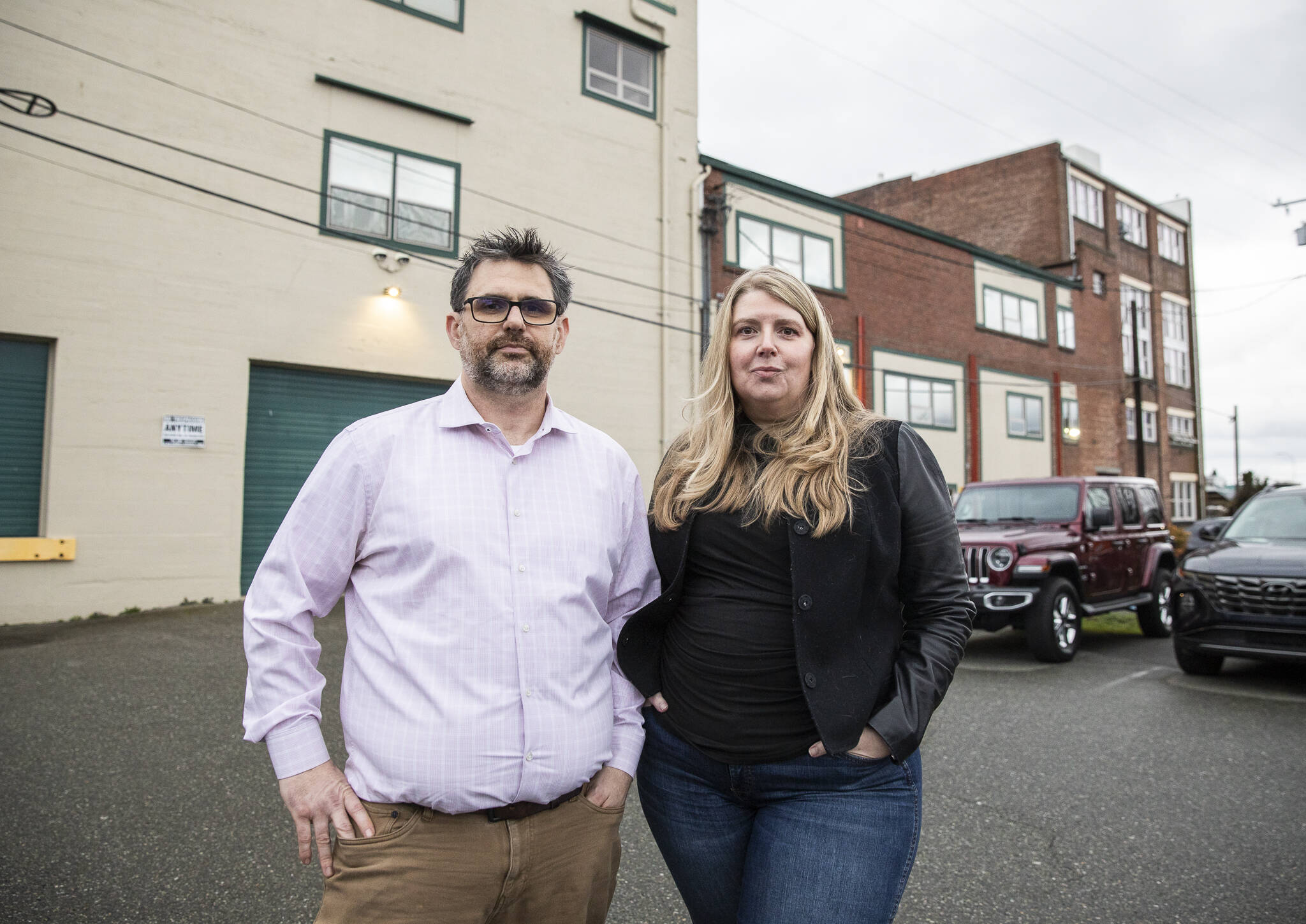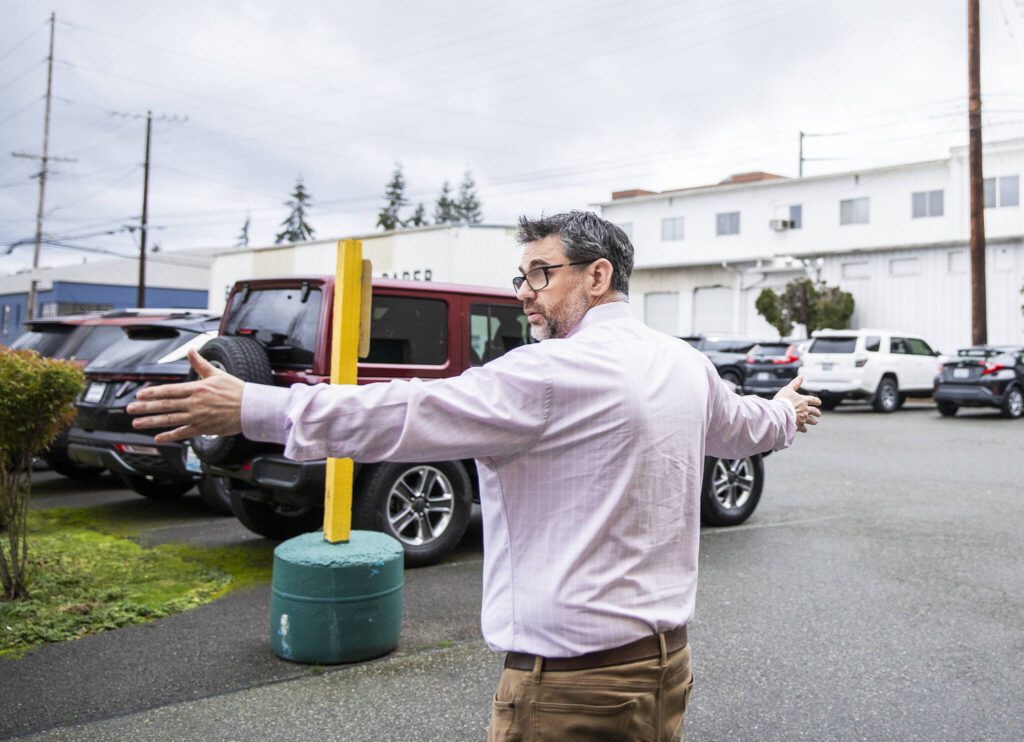EVERETT — Jeremy and Elizabeth Reed have been through a lot since they bought Interface Technologies Northwest in 2018.
Over the past couple of years, the owners of the Everett-based technology company survived a pandemic, major customers going out of business and global supply chain shortages in electronics.
“Now,” Elizabeth Reed said, “The thing that’s going to take us out is a baseball field.”
Their company — along with at least 16 others — is within the two square block radius between Hewitt Avenue and Pacific Avenue along Broadway. That site, following a Dec. 18 City Council vote, is set to be the home of a potential multipurpose stadium the city hopes to build for the minor league Everett AquaSox. After frustrations with what they see as a lack of communication from the city, the two are looking for options of what to do next.
Not everybody on the site opposes the project, however. Nathanael Engen, the owner of indoor mushroom farm Black Forest Mushrooms on Hewitt, is excited about the potential economic development the stadium could bring. A number of other businesses at the site — a vegan restaurant, a coffee stand, a bail bonds service — did not respond to requests for comment.
City staff also stressed that the plans for the stadium are far from complete. Final designs, if the project advances, likely won’t be finished until late 2025 or early 2026.
Living ‘in two realities’
Interface Technologies is located on McDougall Avenue at the north end of the proposed stadium site. At the moment, it’s too early to know what the stadium’s footprint could look like, or if one will even be built, but the uncertainty has left the Reeds in a state of limbo.
“We have to live in two realities for the next few months,” Elizabeth Reed said. “What does it look like if we stay, what does it look like if we leave? And how long to we want to play a game of chicken of staying in case the project doesn’t move forward?”
New requirements introduced by Major League Baseball in 2021 meant the AquaSox’s current stadium — the Everett Public Schools-owned Funko Field — would need significant renovations to be brought into compliance with the league’s standards.
The city spent two years and about $1.1 million to study a number of options on where to put a potential new stadium. Its search eventually narrowed to two options: Renovate Funko Field, or build a new multipurpose stadium in downtown Everett.
After a fiscal advisory committee recommended a downtown stadium would be more financially beneficial, the City Council voted to select the downtown site on Dec. 18. The council’s vote doesn’t commit the city to build a stadium, as that decision won’t come for a number of months at the earliest.
“It’s already damaging our business because I spent a whole day talking to vendors and customers, they all have questions, ‘Are you going to be here in a year?’” Elizabeth Reed said. “And I can’t answer that question. I really can’t.”
Initial renderings of the potential stadium — referred to as a “napkin sketch” by city staff and consultants working on the project, because the design process has not yet begun — would block the freight entrance to Interface Technologies Northwest on McDougall Avenue and get rid of its parking lot.
“Everybody from the city, they say they really want to talk to you, and then they don’t answer your email, and they say this drawing isn’t real. But they keep putting it out there,” Elizabeth Reed said. “‘It doesn’t mean anything, but be comfortable with the investment. The left field is in your parking lot and blocking your entrance, but don’t worry about that, because it doesn’t impact your building.’ I don’t know how to respond to that.”
In a statement, city staff said they will be “conducting outreach to potentially impacted property owners and business tenants as well as other neighbors near the downtown site” as the project moves further along. They were not able to answer specific questions sent by The Daily Herald because design work has not yet begun.
“In early 2025, the project team will talk to Council about next steps for potential property acquisitions, including what those processes could look like and what Council actions would be necessary,” city spokesperson Simone Tarver wrote in an email. “However, until the progressive design build team has been contracted and they have developed a concept for the facility based on the parameters we provide, we can’t know what property acquisitions would be necessary.”
‘I believe in Everett’
Engen, who opened Black Forest Mushrooms on Hewitt in the fall of 2023, believes the stadium would do a lot of good for Everett’s downtown core, he said, even if his company were forced to move to complete the stadium project.
“I think there’s people that really want to see the activation of our downtown area,” Engen said. “We’re seeing the growth that we have been in Everett, and I think big things are coming, not just with the stadium. But I think the stadium is an indicator of how the health of our community is improving.”
Building a downtown stadium could be a driver for economic development, possibly to the tune of $55 million per year, according to an economic impact analysis written for the city in 2022. Researchers have previously called claims of economic benefits from stadium construction into question, but studies have also shown having a minor league team can bring monetary benefits for cities.
Engen hopes the stadium can show people that “Everett is a destination,” he said.
“We have leadership in our city that cares, we’ve got other entrepreneurs in the area that care,” Engen said. “So I’m confident, and I believe in Everett.”
Moving on
For the Reeds, their current location is ideal for their business, as many of their clients are just a couple of miles away. The building has enough storage to handle equipment necessary for their work while remaining affordable. If their freight entrance ends up blocked, the company would be forced to move, the Reeds said.
Moving would be a big task for the company, which employs 23 people. It would cost about $80,000, Jeremy Reed said, and the company would likely need to move to Arlington or Marysville to find a comparable location with similar rent costs.
“I know we’re all tired of talking about COVID, but most of us used all of our reserves during that time period,” Elizabeth Reed said. “I don’t know anybody who has this huge line of credit anymore, and they don’t have the cash stockpiles that they used to have. So I don’t have $80,000 to spend on this (move). I just don’t have it.”
If Engen were to move, however, he said it’s very likely his company would be able to find a new home within Everett.
“If we are relocated, I’m confident we’d be taken care of,” Engen said.
City staff said they are looking to hear from property owners and business tenants who may be affected by stadium construction. Those who may be impacted can contact Scott Pattison, the stadium’s project manager, via email at spattison@everettwa.gov.
“We want to encourage any potentially impacted property owners or tenants, neighbors of the downtown site and members of our community that are interested in this project to check out our website, www.everettwa.gov/mfp, and watch the past briefings on this project to learn more,” Tarver wrote.
What does Jeremy Reed want to hear from the city?
“Honesty,” he said. “I want to hear a realistic approach, not just candy canes and unicorns. Tell us how it’s really going to work and what you’re really going to do.”
Will Geschke: 425-339-3443; william.geschke@heraldnet.com; X: @willgeschke.
Talk to us
> Give us your news tips.
> Send us a letter to the editor.
> More Herald contact information.





























